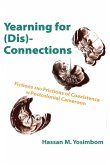The idea of mega-ness is pivotal to the nature, characteristics and vision of megachurches as a social-divine structure grounded on the belief in grand, mega-God, whose omnipotence is revealed, encountered and dramatised in space and place. Although the concept of megachurch has been discursively and theoretically problematic, sprouting and scouting for a big-idea-grasping that is in itself elusive, the book takes a pragmatic detour to engage and nuance, and also beat into manageable shape, what can readily be construed as megachurch, at least, in Africa. It argues that megachurch is not only related to from the prism of its exponentiality and grandiosity, a feature that is pervasive in its conceptualisation, but it is also much more inserted into a socio-cultural, political and religious context, that is at once empirical and relatable, responsible and responsive, daring and appealing, local and transnational, spiritual and mundane, controversial and soothing. The institutionalisation of megachurch legitimises its existence, radar and reach in terms of social mobilisation, charismatics and incarnationality. Central to the praxis of megachurches is digital turn that zooms out the Mega Mega powers and affluence of mega-pastors, mega-narratives, mega-miracles, and mega-messes. All of this is sited and situated most profoundly within the mega-failure of state to be responsible, and account for mega-wealth that African political rulers vanquished into their private lounges. The megachurch and state relations might appear complexified and mutually beneficial, the knack with which some Africa's megachurches' pastors churches churches dribble and meander through this midfield, constantly calls to mind the Megachurches Megachurches claim of divine imprimatur and the future of its pentecostality.
Hinweis: Dieser Artikel kann nur an eine deutsche Lieferadresse ausgeliefert werden.
Hinweis: Dieser Artikel kann nur an eine deutsche Lieferadresse ausgeliefert werden.








